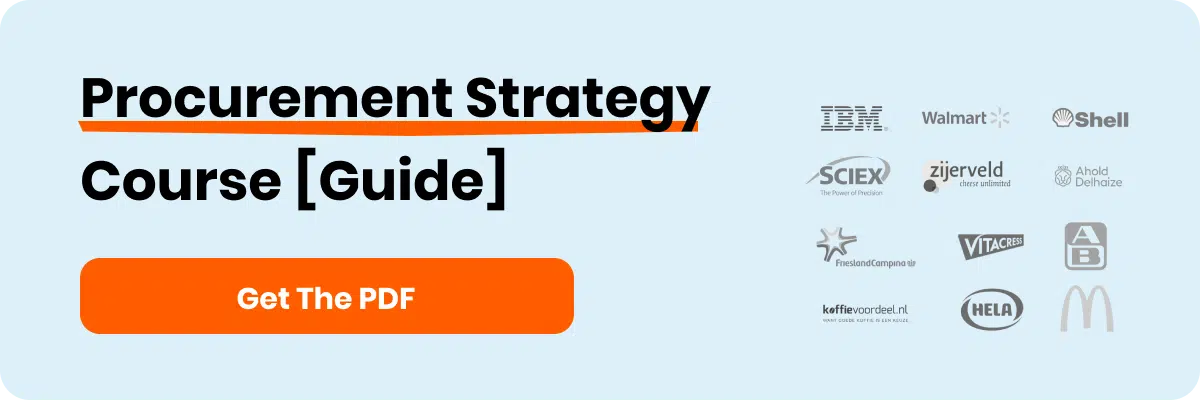ChatGPT & AI in
Procurement Course
Free Preview Lesson

Written by Marijn Overvest | Reviewed by Sjoed Goedhart | Fact Checked by Ruud Emonds | Our editorial policy
Sustainable Procurement Statistics — 21 Key Figures of 2024
Key take-aways
- More than half of global companies worldwide have existing sustainable practices, with many companies following suit.
- Companies and organizations with sustainable practices have increasing brand value as opposed to those without.
- Consumers are purchasing sustainable products or items that are sustainably outsourced.
Sustainable procurement statistics is a topic that many procurement professionals should know. Of course, this subject is timely as many companies continue to commit to a sustainable process of their company.
This article will guide you through the latest sustainable procurement statistics available in 2024. We will discuss some topics that will enable companies to achieve sustainability in their procurement
After reading this article, you will have a great insight into sustainable procurement statistics. Thus, allowing you to know what are the things that will make the shift to sustainability possible.
Sustainable Procurement – 21 Key Figures of 2024
To get to know more about what is currently in the headlines when it comes to numbers in sustainable procurement, here are 21 key figures this year that you need to know:
1. 51% of Global Businesses Have Existing Sustainable Procurement Practices in Place
The business industry has adopted more sustainable practices when Environmental, Social, and Governance (ESG) has become a requirement for businesses around the world. This is the response of the government implementing new regulations for businesses to account for their impact on the environment.
So, in a survey conducted by the Stanford Business School early in 2023, it was found that 51% of global businesses have existing sustainable procurement policies and practices that contribute to the resilience of their value chains.
2. BNEF Forecasts that 90% of Procurement Experts will Require Suppliers to Demonstrate Carbon Neutrality
Carbon neutrality means striking a balance between emitting carbon and absorbing carbon from the atmosphere in carbon sinks; thus it means that any CO2 released into the Earth’s atmosphere from business activities is equated by the amount of CO2 being removed.
So, BloombergNEF’s prediction sheds light on the importance of carbon neutrality being not only a bonus, but a prerequisite for suppliers to have before moving on with contract negotiations and formal transactions. Moreover, it also emphasizes how important the environmental impact reduction practices suppliers take for them to be a core criterion in supplier assessment.
3. Only 2% of Companies in China Prioritize Sustainable Growth
In a recent Accenture report, Chinese companies are reported to be needing to reinvent themselves in order to drive sustainable growth. Moreover, the Accenture China Digital Transformation Index shows that only 2% of Chinese companies have holistic and continuous digital transformation steps required to drive long-term sustainable growth.
Thus, it is quite the irony since Chinese companies dominate the business industry globally. In fact, in 2022, there were 145 of them included in Fortune’s Global 500 world’s largest corporations. So, it is an alarming number that only over a percent of them recognize the importance of sustainable practices to improve business operations.
4. Companies with Well-Founded ESG Credentials Reduce Costs by 5-10%
As the world continues to lean more on sustainability and responsible selling and buying, it becomes increasingly important for the business industry to align procurement tactics with the changing and improving values of shareholders, customers, and employees to ensure business continuity over a long period.
Thus, companies need to adhere to sustainable practices. In fact, according to McKinsey’s research, companies with strong ESG credentials save from 5% to 10% in costs, and top ESG performers grows exponentially by 10-20% more in value against other competitors.
5. Sustainable Procurement Practices Increase Brand Value by 15-30%
More than satisfaction, customers care about being a consumers of brands and companies that are committed to sustainable practices to fight environmental challenges and minimize negative environmental impact as much as possible. Therefore, companies who adopt and adhere to sustainable policies benefit from a more positive brand perception.
Thus, Greenly Institute has shown results that companies with sustainable procurement practices have as much as 15-30% increase in brand value, meaning customers find more value in them.
6. US President Joe Biden Signs Executive Order that Encompasses Carbon-Free Electricity Production by 2030
During the Leaders Summit on Climate, US President Joe Biden announced that the US will continue to combat climate change and promised to reach net zero emissions economy-wide by no later than 2050.
Moreover, creating a carbon pollution-free power sector to reach 100% carbon-free electricity production by 2035 is one of the existing goals President Biden discussed during the summit.
President Biden has signed an executive order that encompasses some bold and ambitious commitments including 1100% carbon-free electricity production by 2030 and net-zero emissions from federal procurement no later than 2050.
7. Nearly Half, 45% of Public Sector Organizations Include Sustainability Criteria in Procurement Policies
One of the main requirements of the business industry calls for both private and public sector organizations to acknowledge the vital pertinence of sustainability and integrate and adhere them in their procurement policies.
As Spend Matters reported, during the first half of 2023, about 45% of public sector organizations recognized sustainable practices in procurement as vital to ensure business continuity. Thus, it serves both a testament to the advances the industry already made and a call-to-action for organizations who have yet to follow.
8. Global ESG Assets may Surpass $50 Trillion by 2025
Due to the trend of increasing global ESG assets that started in 2020, Bloomberg Intelligence predicted that they may be valued at more than $50 trillion by 2025 assuming 15% growth in total. Moreover, the US is taking the lead with more than 40% growth since 2022 and influences the global ESG growth results by a lot.
Furthermore, this figure highlights that organic growth will not be hindered or discontinued, rather it will continue to improve in numbers and statistics led by companies, development projects, and central banks.
9. By 2026, 70% of Technology Procurement Leaders will have Environmental-Sustainability-Aligned Performance Objectives
Gartner identified that environmental sustainability has become a top 10 business priority for CEOs which demanded that their businesses align with environmental performance from sourcing functions.
So, they predicted that 70% of technology sourcing, procurement, and vendor management (SPVM) leaders will have environmental-sustainability-aligned performance objectives for their functions by 2026. Moreover, 75% of global companies will increase business with IT vendors that will have to demonstrate sustainable goals and timelines and will see to it that they replace suppliers that do not.
10. Amazon Business Reports 67% of Consumers to Purchase Sustainable Products in 2023
Early 2023, Amazon Business surveyed 5, 000 enterprise employees across France, Germany, Spain, and the UK on their companies’ approach to more sustainable purchasing. They found that 67% of them choose to purchase sustainable products as social and environmental considerations become a core driver to combatting environmental challenges.
However, it was not Gen Z that led the shift. Rather, they were employees aged from 55 and up to consider sustainability while making purchasing decisions compared to Gen Z with only 31%.
11. 70% of European Employees were Not Aware of Their Companies’ Sustainable Guidelines and Policies in Procurement
In the same report, only 14% of 5, 000 employees across France, Italy, Germany, Spain, and the UK said that they felt confident about making more sustainable procurement processes on behalf of their businesses. To add to that, a worrying 70% were not aware of what socially responsible purchasing guidelines exist within their companies and 41% of which are completely unaware of any guidance whatsoever.
Thus, although with the increasing importance rate of sustainability to exist in businesses, these figures are a reflection that some do not train or ensure that their employees adhere to such practices.
12. 58% of Global Organization Monitor Suppliers’ Sustainability Performance
As part of supplier relationship management (SRM), companies also assess their suppliers whether their sustainability goals align with one another. PR Newswire reports that more than half of surveyed global companies commit to monitoring their suppliers’ sustainability performance.
Thus, it paints a vivid picture that the 2023 penetrative reach of sustainability in procurement processes acts as a testimony to the trend of businesses expanding their commitment to sustainability beyond their operational and organizational boundaries.
13. In 2023, the AI Market is Valued at $136 Billion and Expected to Expand at 37.3% by 2023
The growing demand for artificial intelligence technologies, especially in economies and the business industry will need to be met with standards for responsible AI practices in procurement.
Furthermore, the figures reported by the World Economic Forum serve as a basis for how much companies will invest in AI and machine learning technologies to streamline procurement processes and optimize business operations. Moreover, such advancements will help them protect their businesses from potential risks related to intellectual property, data, and privacy.
14. AI Use for Environmental Purposes Can Contribute Up to $5.2 Trillion to the Global Economy by 2030
Aside from streamlining procurement processes and overall business operations, artificial intelligence can help provide insights into how businesses can positively impact the environment.
Moreover, PwC reports that AI and machine learning can reduce greenhouse gas (GHG) emissions by 4%. With that, AI for environmental purposes can also contribute up to $5.2 trillion to the global economy by 2030.
With these figures, it can be noted that sustainability does a lot more than save the planet, but also brings a lot of value to the global economy.
15. 48% of Global Companies Experience Pressure to Embrace Greener Procurement Processes in 2023
Amidst environmental sustainability concerns, 48% of companies globally face pressure to adopt eco-conscious practices in their supply chains. Moreover, the world pushes the business industry for greener operations, emphasizing reduced carbon emissions, responsible sourcing, and increased use of alternative fuels in shipping.
Thus, the top 3 areas that businesses report prioritizing for supply chain sustainability are electrification at 40%, natural resource management at 29%, and water usage and the transition to renewables at 27%. These initiatives bring the business industry closer to its goal of going 100% sustainable.
16. IBM Shows that 54% of All Consumers are Willing to Pay More for Products from Companies that are Socially Responsible
As part of their 2023 report about sustainability, IBM shows a figure of 54% of all global consumers are willing to pay more for products from companies that are considered socially and environmentally responsible. They place an impressive value on positive impact to the society which not only shows how ready they are to shoulder premium costs but also reflect their concern for the world.
Thus, this also mirrors an impactful insight for other consumers to follow. A sustainable procurement process and overall supply chain illustrate the benefits of shifting to environmentally-conscious business models.
17. Transitioning to Sustainable Practices Globally can Lead to $26 Trillion in Savings by 2030
The United Nations Report on Climate Action states that it is not just a budget buster or an economy wrecker. In reality, shifting to a greener economy could yield a direct economic gain of $26 trillion by 2030 compared with traditional business operations.
To expound on this further, adopting sustainable practices in the business industry can generate more income than usual because although investing upfront can cost more, they are actually less costly than business-as-usual in the long run. In addition, this shift can also produce over 65 million new low-carbon job opportunities.
18. As of 2023, the Transport Sector Accounts for 15% of Total Greenhouse Gas Emissions – the 4th Largest Source of Global Emissions
In the same report made by the UN, after the power, industry, and agriculture-forestry-land use sectors, the fourth largest source of global emissions is greenhouse gas; and 14% of it is composed of the transport sector.
So, sustainable procurement practices and the adoption of decarbonizing in the transport sector which includes various transformative measures like electromobility, alternative fuels for shipping and aviation, advanced biofuels, ammonia, synthetic fuels, and demand and efficiency strategies.
19. Sustainability-Focused S&P 500 Companies have 18% Higher Returns on Investment
The Standard & Poor’s or the S&P 500 Index, a market capitalization-weighted index of 50 leading publicly traded companies in the US, has almost a hundred percent of companies publishing a sustainability report starting from 2020. Moreover, in their most recent report, results showed that sustainability-focused S&P 500 companies have a bigger number of ROIs reaching up to 18%. Furthermore, this figure, is an eye-opener for most (if not all) global businesses to shift to a more sustainable approach in their business operations.
20. Business Can Make a Major Impact and Account for 60% of Emissions Cut by 2030
According to Environmental Sustainability, an island of plastic with approximately 1.5 million square kilometers is floating in the Pacific Ocean. More than that, the world is actually on pace to produce at least 27 billion tons of solid waste by 2050 due to a business environment that prioritizes fast and rapid production and turnover of products for bigger and maximum profits.
In addition, mismanaged CO2 emissions are also projected to increase temperature of two degrees Celsius by 2050 which will, in turn, cause sea levels to rise and catastrophic weather events to increase. To make it worse, another study discovered that as small as 100 companies globally are responsible for an alarming rate of 71% of global emissions.
However, as per the Paris Climate Accord, the business industry can actually account for 60% of emissions cuts by 2030 and avoid major environmental consequences should they adopt and shift to more sustainable practices.
21. 94% of CPOs Claim that Their Senior Leadership Team and CEOs are Interested in Sustainable Procurement Practices
Sustainability in procurement processes has become an integral part of successful business operations. What is currently seen as an extra step when dealing with suppliers and purchasing resources, will ultimately become a non-negotiable measure for all companies and their respective supply chains.
Moreover, in Supplier Day’s case study, it was revealed that 94% of the CPOs they surveyed claim that their senior leadership teams and CEOs have taken a keen interest in practicing sustainable procurement processes.
Sustainable Procurement Statistics: What Does it Mean?
The COVID-19 pandemic is still present even though many countries have started to vaccinate their citizens. Additionally, the ongoing war between Ukraine and Russia, high inflation among countries, high carbon emissions, and shortages of supplies are what the supply chain is facing right now.
However, many companies are committing to switch to a sustainable supply chain and procurement to counter these factors. This is due to the fact that sustainability in the process of companies can lessen the effects that are brought by these factors.
Although the commitment of some companies is still in its early stages, their willingness to have sustainable objectives and goals is visible in order to help the environment and society recover.
Automation in Sustainable Procurement
Shifting from a sustainable procurement means integrating new technologies that consume less energy to make the procurement processes efficient while considering the health of the environment and society.
Through automation, businesses can go on a paperless process. According to a study, businesses produce 21 million tons of paper waste each year. Thus, automation saves paper and makes it easier for everyone to access information through their system.
Automation can also make manufacturers reduce their energy consumption. Automation can decrease heating requirements and reduce cycle times. Additionally, it can lower the amount of energy that is needed for operation. Thus, lowering the carbon emissions of manufacturing companies by using less energy.
Net-Zero Commitments by Companies
Multinational companies like Unilever have committed to a net-zero operation. Through Unilever’s action plan, it has set a clear pathway to have zero emissions in its operation by 2030 and net zero emissions across its value chain by 2039.
Although many multinational companies like Unilever are switching to a sustainable procurement and supply chain, many small to midsize companies are just starting to hear about sustainability.
The growing alliance of countries, cities, companies and other institutions are pledging to get to net-zero emissions. More than 70 countries, which includes the largest polluters — the United States, China, and European Union — have a zero net target that covers about 79% of global emissions.
According to Antonino Guterres, the United Nations Secretary-General, they need commitments that will deliver a reduction of emissions by 45% by 2030 to reach net zero emissions by mid-century.
Shortages and Inflation
The rising prices due to shortages deepen the challenge for those who are not able to pay for food in normal times. Acute hunger is driven by three things which are conflicts, climatic shocks, and economic and social fallouts due to the pandemic.
The economic fallout from the COVID-19 pandemic has shocked the world economy as incomes are severely struck by job losses. Additionally, inflation has ramped up due to supply chain disruptions.
The current food crisis is about affordability. Food is available but it is beyond the reach of millions of people. Sustainable procurement aims that all actors in the supply chain must have a dignified price. Thus, everyone can afford to buy their needed products, especially food for people.
Conclusion
In 2024, sustainable procurement is a global trend, with 51% of businesses adopting eco-friendly policies. Companies benefit from reduced costs (5-10%) and increased brand value (15-30%). Notably, 90% of procurement experts seek carbon-neutral suppliers. However, only 2% of Chinese firms prioritize sustainability.
Automation aids in paperless processes, reducing waste. Despite challenges like geopolitical conflicts and inflation, businesses commit to net-zero operations and join global alliances. Sustainability isn’t just a trend; it’s a crucial step toward a resilient and equitable future.
Resources:
FrequentlyAsked Questions
What is sustainable procurement?
Sustainable procurement refers to the adoption of environmental, social, and governmental factors while also considering the price and quality of materials that an organization will acquire.
What is the importance of sustainability in procurement?
Sustainability in procurement is important as it helps organizations by improving their finances and processes against a range of challenges that can disrupt the supply chain.
What is net zero?
Net zero refers to greenhouse gasses going into the atmosphere being balanced out by the removal of it from the atmosphere.
About the author
My name is Marijn Overvest, I’m the founder of Procurement Tactics. I have a deep passion for procurement, and I’ve upskilled over 200 procurement teams from all over the world. When I’m not working, I love running and cycling.

Popular Procurement Courses
At Procurement Tactics, we educate Procurement Professionals to close better deals, secure supply and advance their career. Our courses are online and self-paced.

Negotiation Course for Procurement
Learn from industry experts who negotiated billion $ deals

ChatGPT & AI in Procurement Course
Unleash the power of ChatGPT & AI within procurement

Mini-MBA for Procurement Managers
Enhance your expertise to make valuable strategic contributions
Related Articles
Strawberry Prices – Historical Graph [Realtime Updates]
Strawberry Prices – Historical GraphPopular questions about strawberry prices: Why are strawberry prices fluctuating? Which variables impact the price of strawberries? Where do strawberries come from? What is the future price of strawberries? Strawberry Prices...
Vegetable Oil Prices – Historical Graph [Realtime Updates]
Vegetable Oil Prices – Historical GraphVegetable oil questions about avocado prices: Why are vegetable oil prices fluctuating? Which variables impact the price of vegetable oil? Where does vegetable oil come from? What is the future price of vegetable oil? Vegetable...
AI Cost Savings — 5 Ways AI Drives Value in Procurement
ChatGPT & AI inProcurement CourseFree Preview LessonWritten by Marijn Overvest | Reviewed by Sjoerd Goedhart | Fact Checked by Ruud Emonds | Our editorial policyAI Cost Savings — 5 Ways AI Drives Value In ProcurementTable of content AI in Cost Savings 5 Ways AI...



![Strawberry Prices – Historical Graph [Realtime Updates]](https://procurementtactics.com/wp-content/uploads/2024/04/Strawberry-Prices-400x250.jpg)
![Vegetable Oil Prices – Historical Graph [Realtime Updates]](https://procurementtactics.com/wp-content/uploads/2024/04/Vegetable-Oil-Prices-400x250.jpg)
